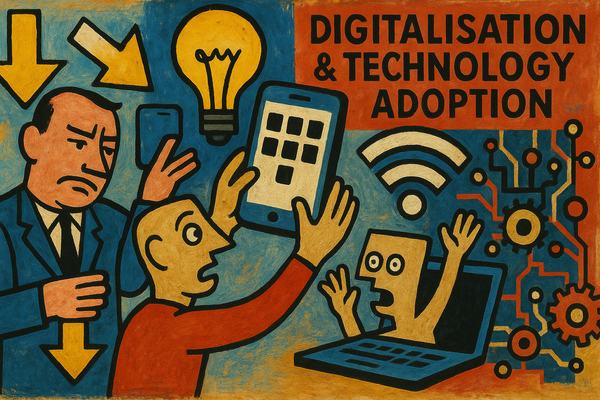Blockchain & Digital Transparency: The Next Step in Eco-Certifications?
As eco-conscious travellers demand greater transparency, blockchain technology is emerging as a powerful tool to verify sustainability claims and prevent greenwashing in tourism.

As eco-conscious travellers demand greater transparency, blockchain technology is emerging as a powerful tool to verify sustainability claims and prevent greenwashing in tourism. This article explores how blockchain is transforming eco-certifications by ensuring immutable, real-time verification of sustainability data, with applications ranging from carbon offset tracking to smart contracts for sustainable travel rewards.
The Credibility Gap in Sustainability Certifications
Eco-certifications have become a key marketing tool for tourism businesses aiming to position themselves as environmentally responsible. Labels such as Green Globe [1], EarthCheck [2], and the Global Sustainable Tourism Council (GSTC) [3] have proliferated, providing consumers with assurances that destinations and operators meet certain sustainability criteria [4]. However, concerns over transparency, inconsistent enforcement, and the potential for greenwashing have eroded trust in these certifications. While green branding can enhance perceived value and trust in sustainability initiatives [5], many schemes still depend on self-reporting or periodic audits, leaving room for misrepresentation and selective disclosure [4].
High-profile cases of greenwashing have further undermined confidence in eco-certifications. The cruise industry, for example, has faced criticism for environmental damage despite sustainability claims. Carnival Cruise Line’s Celebration Key project in the Bahamas resulted in severe ecological harm, including the destruction of mangroves and marine habitats [6]. Similarly, airlines have been scrutinised for misleading carbon neutrality claims, with Qantas facing legal challenges over its “fly carbon neutral” program [7]. The hospitality sector is also under scrutiny, with some hotels overstating their sustainability efforts by marketing minor changes—such as energy-efficient lighting—as comprehensive environmental initiatives [8].
Research indicates that consumers increasingly scrutinise sustainability claims and expect independently verifiable credentials rather than marketing-driven certifications [4]. The challenge for the tourism industry is to provide an immutable and transparent record of sustainability efforts—one that builds credibility while resisting manipulation.
While blockchain offers a promising solution, its adoption in the tourism sector faces challenges that must be addressed.
How Blockchain Prevents Greenwashing
Blockchain is a decentralised, tamper-proof digital ledger that records transactions in a transparent and verifiable manner [9]. At its core, blockchain relies on distributed consensus mechanisms to validate and store data across a peer-to-peer network, ensuring that records are immutable and resistant to fraud [10]. By applying blockchain to eco-certifications, tourism businesses can move beyond self-reported data and provide an auditable, real-time account of sustainability practices [11].
In the context of sustainable tourism, blockchain can track key sustainability metrics such as carbon emissions, water consumption, and waste management in real time. Each record is immutable, meaning it cannot be altered or deleted without consensus from the network, ensuring that sustainability claims are backed by verifiable data [12]. This model eliminates the risk of retroactive adjustments or selective disclosures that might mislead consumers.
Third-party verification also becomes more effective with blockchain. Independent auditors or certification bodies can verify sustainability data in real time, rather than relying on periodic reviews. This continuous verification model reduces the risk of certification fraud and strengthens consumer trust in eco-labels [13].
Public vs. Private Blockchains in Sustainability Certifications
It’s important to distinguish between public and private (permissioned) blockchains when considering their application in sustainability certifications. Public blockchains, like Bitcoin and Ethereum, are open networks where anyone can participate in transaction validation. While they offer high transparency, they often face challenges related to scalability and energy consumption [9].
In contrast, private blockchains are restricted networks where only authorised participants can validate transactions. These networks can achieve higher transaction throughput and faster confirmation times compared to public blockchains, making them more suitable for enterprise applications, including sustainability tracking [10]. For instance, a private blockchain deployed within a supply chain ecosystem can process a large volume of transactions, such as inventory tracking and product authentication, without experiencing congestion or delays [11].
Real-World Applications of Blockchain in Sustainability
Several organisations have successfully implemented blockchain technology to enhance transparency and sustainability:
OpenSC: A platform developed by WWF Australia and BCG Digital Ventures, OpenSC uses blockchain to track products throughout their supply chain, verifying sustainable production claims. Consumers can view a product’s history by scanning a QR code, ensuring ethical sourcing [14].
KlimaDAO: A decentralised autonomous organisation (DAO) that aims to drive climate action by purchasing and locking carbon credits on the blockchain. By leveraging decentralised finance (DeFi), KlimaDAO creates a transparent and accessible carbon market, allowing individuals and businesses to participate in offsetting emissions through blockchain-based transactions [15]
Regen Network: Focused on ecological monitoring, Regen Network uses blockchain to track and verify ecological data, promoting regenerative land management practices [16].
These examples demonstrate blockchain’s potential to provide transparent, verifiable records of sustainability efforts, thereby enhancing consumer trust and preventing greenwashing.
Addressing Energy Consumption Concerns
While blockchain offers significant benefits in transparency and immutability, it’s crucial to address concerns regarding energy consumption. Traditional Proof of Work (PoW) consensus mechanisms, used by cryptocurrencies like Bitcoin, are energy-intensive. However, alternatives such as Proof of Stake (PoS) have been developed to reduce environmental impact. For example, Ethereum’s transition to PoS reduced its energy consumption by over 99.9% [17].
Private blockchains, often used in enterprise settings, typically employ consensus mechanisms that are less energy-intensive than PoW, further mitigating environmental concerns [18]. By carefully selecting and designing blockchain systems, organisations can leverage the technology’s benefits while aligning with sustainability goals.
Eco-Tourism Brands Leveraging Blockchain
A number of forward-thinking brands have begun integrating blockchain to enhance transparency in their sustainability initiatives.
Chooose: A climate-tech company that enables travellers to offset their carbon footprint in real time. Chooose uses blockchain to verify the legitimacy of carbon offsets, ensuring that funds are directed toward accredited climate projects.
TUI Group: One of the world’s largest travel operators, TUI has explored blockchain to improve traceability in its supply chain, including its sustainability initiatives. Blockchain ensures that eco-certified hotels and tour operators meet required sustainability standards.
TravelX: A platform that leverages blockchain technology to create a more transparent and efficient travel booking process, aiming to reduce intermediaries and enhance trust in travel transactions[19].
The Potential for Smart Contracts in Sustainable Travel
Integrating blockchain-based smart contracts into sustainable tourism offers innovative ways to promote eco-friendly practices. Smart contracts are self-executing agreements with terms directly written into code, automatically triggering actions when predefined conditions are met. In the tourism sector, they can facilitate various sustainability initiatives:
Loyalty Programs Tied to Sustainable Behaviour: Travellers who opt for carbon-neutral transportation or eco-certified accommodations can automatically receive rewards, such as digital tokens or discounts, through smart contracts. This approach not only incentivises sustainable choices but also enhances customer engagement. [20]
Verified Carbon-Neutral Bookings: Smart contracts can assess and confirm whether an entire trip—including flights, hotels, and activities—meets carbon neutrality standards before finalising a booking. This ensures that travellers’ environmental commitments are honoured throughout their journey. [21]
Supply Chain Transparency: Hotels and tour operators can utilise smart contracts to provide real-time sustainability data, allowing travellers to verify aspects like energy consumption, waste management, or local sourcing of products before making reservations. This transparency builds trust and encourages informed decision-making. [22]
By adopting blockchain-enabled smart contracts, the tourism industry can move beyond passive awareness campaigns and actively reward eco-friendly choices, fostering a more sustainable future.
Challenges & Future Outlook
Despite its promise, blockchain adoption in tourism faces several barriers. The first is scalability. Managing vast amounts of sustainability data on a blockchain network requires significant computing resources, raising concerns about efficiency and cost. While public blockchains like Ethereum have historically struggled with transaction throughput, the transition to Proof of Stake (PoS) has significantly reduced energy and resource constraints . Additionally, private blockchain frameworks such as Hyperledger Fabric provide scalable alternatives for enterprises that need faster verification and lower operational costs [23].
Another critical challenge is regulatory uncertainty. While blockchain offers transparency, compliance with data protection laws such as GDPR remains complex. Blockchain’s immutability can conflict with GDPR’s “right to be forgotten” principle, raising questions about how personal information is stored, shared, and deleted. To address these concerns, businesses implementing blockchain in eco-certifications must explore privacy-preserving blockchain architectures, such as zero-knowledge proofs or permissioned blockchains that allow controlled data access [24].
Widespread industry adoption also remains a challenge. Many small tourism operators lack the technical expertise and financial capacity to integrate blockchain solutions. Blockchain-as-a-service (BaaS) providers, such as IBM Blockchain and Microsoft Azure, offer potential solutions by providing plug-and-play blockchain infrastructure that reduces implementation complexity. Government incentives and partnerships with certification bodies could also accelerate adoption by standardising industry-wide blockchain frameworks for eco-certifications.
Looking ahead, blockchain’s role in sustainability verification will depend on collaboration between tourism associations, certification bodies, and regulators. If key stakeholders align on interoperable, standardised blockchain solutions, the technology could eliminate greenwashing risks and redefine trust in sustainability claims. As digital transparency becomes a competitive differentiator, early adopters in the eco-tourism sector will gain a significant advantage in consumer trust and brand credibility.
If blockchain adoption accelerates, regulatory clarity, technological standardisation, and cost reductions will be critical to its widespread success in eco-tourism. The next evolution of sustainable travel will not only require businesses to ‘walk the talk’ but to prove it—immutably and transparently.
References
[1] Green Globe – Sustainability Certification for Tourism: https://www.greenglobe.com\
[2] EarthCheck – Scientific Benchmarking for Sustainable Tourism: https://earthcheck.org\
[3] Global Sustainable Tourism Council (GSTC) – Setting Global Standards for Sustainable Tourism: https://www.gstcouncil.org\
[4] Lee et al. (2018) – Do Green Awards and Certifications Matter? https://doi.org/10.1177/1354816618810563\
[5] Chen (2010) – The Drivers of Green Brand Equity https://doi.org/10.1007/s10551-009-0223-9\
[6] The Guardian – Cruise Ships and Environmental Damage in the Bahamas: https://www.theguardian.com/environment/2024/nov/27/tourism-cruise-ships-royal-caribbean-disney-carnival-bahamas-celebration-key-resort-environment-wildlife\
[7] The Guardian – Qantas Greenwashing Complaint Over Carbon Neutral Claims: https://www.theguardian.com/business/2024/oct/16/qantas-greenwashing-complaint-accc-carbon-neutral-tickets\
[8] The Guardian – Hospitality Industry’s Sustainability Initiatives Scrutinised: https://www.theguardian.com/travel/2007/may/13/escape.hotels\
[9] Ghiro et al (2021). What is a Blockchain? A Definition to Clarify the Role of Blockchain in the Internet of Things. arXiv preprint arXiv:2102.03750. Retrieved from https://arxiv.org/abs/2102.03750
[10] Christidis, K., & Devetsikiotis, M. (2016). Blockchains and Smart Contracts for the Internet of Things. IEEE Access, 4, 2292-2303. Retrieved from https://doi.org/10.1109/ACCESS.2016.2566339
[11] Zheng, Z., Xie, S., Dai, H., Chen, X., & Wang, H. (2018). Blockchain Challenges and Opportunities: A Survey. International Journal of Web and Grid Services, 14(4), 352-375. Retrieved from https://doi.org/10.1504/IJWGS.2018.10016848
[12] Khan, M. A., & Salah, K. (2018). IoT security: Review, blockchain solutions, and open challenges. Future Generation Computer Systems, 86, 713-726. Retrieved from https://doi.org/10.1016/j.future.2017.11.022
[13] Nakamoto, S. (2008) Bitcoin. A peer-to-peer electronic cash system. https://ssrn.com/abstract=3440802
[14] The World Wildlife Fund Australia. Retrieved from https://wwf.org.au/get-involved/panda-labs/wwf-australia-and-opensc/
[15] Blaize Tech – Embracing Blockchain for Carbon Credits and Green Tech: https://blaize.tech/blog/embracing-blockchain-for-carbon-credits-and-green-tech/
[16] Regan Registry. Retrieved from https://www.registry.regen.network/
[17] Ethereum Foundation. (n.d.). Ethereum Energy Consumption. Ethereum.org. Retrieved from https://ethereum.org/en/energy-consumption/
[18] Casper Network. (n.d.). Proof of Stake Energy Consumption Guide. Casper Network. Retrieved from https://www.casper.network/get-started/proof-of-stake-energy-consumption
[20] Intellect Discover (2023) Blockchain and Smart Contracts in Sustainable Travel: Incentivising Eco-Friendly Tourism Choices. Available at: https://intellectdiscover.com/content/journals/10.1386/tmsd_00074_1 (Accessed: 14 February 2025).
[21] ACM Digital Library (2024) Blockchain and Smart Contracts for Enhanced Traceability in Cultural and Tourism Industries. Available at: https://dl.acm.org/doi/10.1145/3686424.3686468 (Accessed: 14 February 2025).
[22] ErdemBAYDENİZ (2023) Blockchain Technology in Tourism: Pioneering Sustainable and
Collaborative Travel Experiences. Journal of Tourismology. Available at: https://cdn.istanbul.edu.tr/file/JTA6CLJ8T5/779A0F2831474672B55267706E9BE029 (Accessed: 14 February 2025).
[23] LF Decentralized Trust. Hyperledger Fabric: Blockchain for Enterprise Scalability. Available at: https://www.hyperledger.org/use/fabric (Accessed: 14 February 2025).
[24] Zyskind, G., Nathan, O. & Pentland, A. (2015) Decentralizing Privacy: Using Blockchain to Protect Personal Data. Proceedings of the IEEE Security and Privacy Workshops. doi:10.1109/SPW.2015.27. Available at: https://doi.org/10.1109/SPW.2015.27 (Accessed: 14 February 2025).




